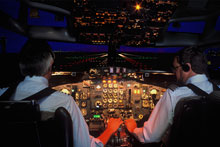With the unemployment rate nationally still hovering around 9 percent, many people are grateful simply to get a paycheck -- but gratitude doesn't take the stress out of the daily grind.
| More from CNBC.com • America's Most Stressful Jobs • America's Highest Paid CEOs • Dirty Jobs |
To get a sense of the most stressful jobs in America, CareerCast.com looked at 11 different factors that can cause stress on the job, and ranked 200 professions by how significantly these demands factor into the average workday. Factors that weighed into stress include work environment, job competitiveness, physical demands, deadlines, on-the-job dangers and even the job's growth potential.
Tony Lee, publisher of CareerCast.com, highlights an interesting trend in America's job market: "As for people who want to throw themselves into bigger challenges, there are simply less of those people than there used to be. "This phenomenon is having an effect on new entrants into the job market. Specifically, he says, new college graduates are seeking jobs that bring them less stress, a choice that may be difficult to realize for individuals who have been entrenched in their jobs for an extended period of time.
Lee says there will always be people willing to take on the challenges of consistently stressful jobs, such as firefighters and policemen. However, these professions feel the additional stress of the overall economy in the form of uncertainty about budget cuts and pension benefits -- which can considerably add to an already stressful job.
For almost every job in America, the recession has in some way affected how individuals feel in their everyday work routine. How have the rankings of stressful jobs changed and which jobs rank as the most stressful this year? Let's take a look.
 ©Dale Wilson/Photographer's Choice/Getty Images |
1. Commercial Airline Pilot
Stress score: 47.60
Average annual salary: $117,060
Hours per day: 9
Average annual salary: $117,060
Hours per day: 9
The most stressful job of 2011 is a commercial airline pilot, according to CareerCast.com. Tony Lee points out that several recent events demonstrate how a pilot's job can be stressful, as it depends on factors out of their control. For instance, a pilot must rely heavily on equipment: the incident with the damaged Southwest 737 earlier this year revealed how this reliance can cause tension during a pilot's normal working day. In addition, a pilot's reliance on control tower operators also increases stress, especially after the revelations that air traffic controllers are falling asleep on the job, requiring planes to land without help.
Pilots also experience big swings in stress, says Tony Lee, going from "periods of extremely low stress when they're not flying, followed by periods of extremely high stress. And these stressful swings are not the best thing for your health." The profession has also been affected by the economy, he says, with layoffs, high oil prices, and cost cutting in the airline industry threatening pay raises and employment levels. For these reasons, being a commercial airline pilot is the most stressful job in America this year.
 ©Jon Feingersh/Blend Images/Getty Images |
2. Public Relations Executive
Stress score: 47.60
Average annual salary: $101,850
Hours per day: 9
Average annual salary: $101,850
Hours per day: 9
Public relations executives are "completely at the mercy of their clients and buyers," says Tony Lee, noting that their success or failure depends on the actions and decisions of clients, creating a stressful situation because their performance is in many ways out of their hands.
They also bear the burden of being connected constantly to social media while also managing small details of several campaigns at once.
 ©Getty Images |
3. Senior Corporate Executive
Stress score: 47.41
Average annual salary: $167,280
Hours per day: 11
Average annual salary: $167,280
Hours per day: 11
Corporate executives are highly paid, and for a good reason: they have held one of the most stressful jobs in America for the past two years. Not only does the job require extensive knowledge of business but also involves understanding trends, technological developments, and implications of their decisions.
"Corporate executives are at the behests of their shareholders and corporate boards," says Tony Lee. "They have to keep their company profitable, which is a complex task. In an upturn, they have higher expectations, and they can't simply cut costs and ride out the recession. They're being held to a higher standard now that the economy is on the rebound -- and much of the time, they are not in control of their own destiny."
 ©TommL/Vetta/Getty Images |
4. Photojournalist
Stress score: 47.09
Average annual salary: $43,270*
Hours per day: Varies
Average annual salary: $43,270*
Hours per day: Varies
Much like newscasters, photojournalists are expected to be on the front lines, with a job description that requires them to enter some of the most dangerous, remote or volatile places on earth. Many are on call 24 hours a day. And when news breaks, the photojournalists may have to mobilize with extremely short notice and stay on assignment for extended periods of time.
The dangers of the job are also evident: earlier this year, four journalists for the New York Times were captured and held in Libya and eventually released. In fact, journalists in the U.S. and abroad are killed in the line of work every year (16 so far in 2011 as of this writing), according to the Committee to Protect Journalists.
Also highlighting the dangers of the job is the most recent tragedy involving photojournalists Tim Hetherington and Chris Hondros, who were killed covering the events in Libya. Two other photojournalists were also injured in the incident, and their wounds -- although severe -- are not thought to be fatal.
Working in dangerous areas is just part of the job for photojournalists like Hetherington, who co-directed the Academy Award-nominated documentary on Afghanistan "Restrepo," and Hondros, who was a 2004 Pulitzer Prize finalist for his coverage of unrest in Libya.
-- This figure corresponds to "Reporters and Correspondents" according to the BLS.
 ©Grafissimo/Vetta/Getty Images |
5. Newscaster
Stress score: 43.56
Average annual salary: $43,270*
Hours per day: 8
Average annual salary: $43,270*
Hours per day: 8
The news business is always a stressful place. Because of global crises, environmental disasters, and wars, newscasters are on call 24 hours a day, 7 days a week. They research, write, and report from the front lines, and they're expected to go on-air with little or no preparation.
Technology is another reason the job of a newscaster is stressful: they must be continually plugged in, interacting with the dynamic landscape of the internet, which is continuously changing the way they broadcast the news. "It just doesn't get much more stressful than the expectations put on someone involved in the news," says Tony Lee.
-- This figure corresponds to "Reporters and Correspondents" according to the BLS.

No comments:
Post a Comment